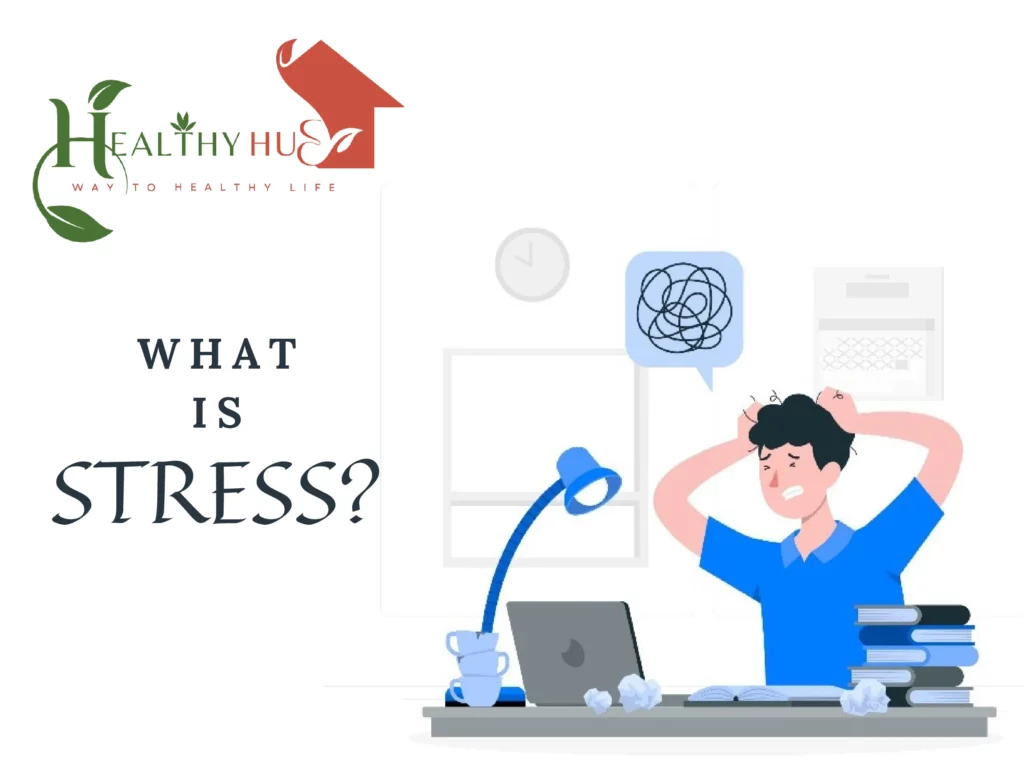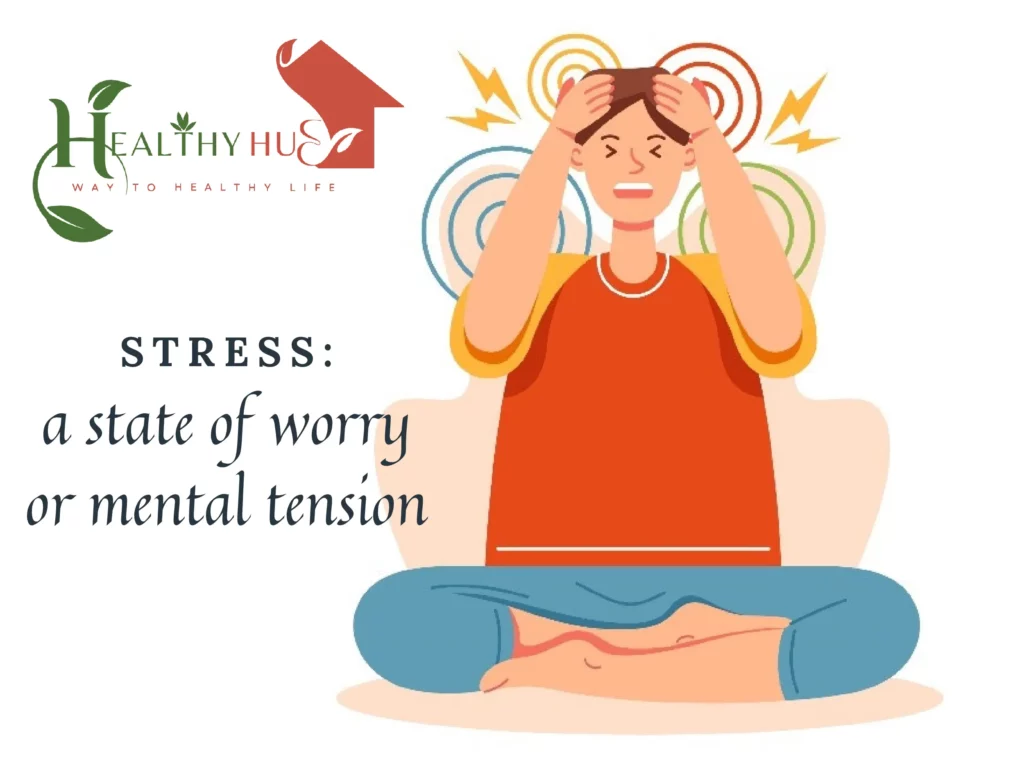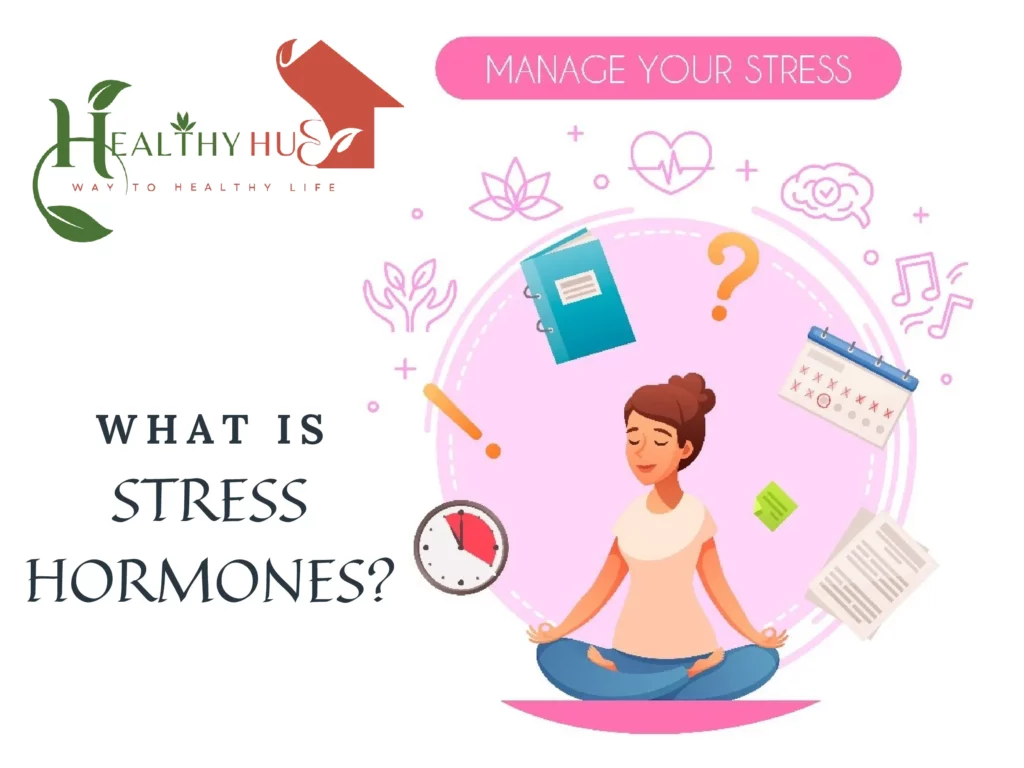In today’s fast-paced world, stress is an all-too-familiar companion for many of us. Whether it’s the daily demands of work, personal challenges, or unexpected crises, stress can cast a long shadow over our lives.
But what exactly happens within our bodies when we’re in the waves of stress? That’s where stress hormones come into play To get to know all about stress we need to dive deep into the fascinating world of stress hormones, and need to know what are stress hormones, shedding light on the science behind their release, their impact on our physical and mental well-being, and, most importantly, how we can harness this knowledge to better manage stress and lead healthier, more balanced lives.

WHAT IS STRESS?
Stress is a natural and adaptive response that the body experiences when it perceives a threat, challenge, or demand. It’s a physiological and psychological reaction that prepares an individual to deal with the situation at hand. Stress can be triggered by a wide range of circumstances, including both positive events (e.g., starting a new job, getting married) and negative ones (e.g., financial difficulties, health issues).
Stress is always individual, What one person found stressful is not necessarily stressful for another person. In the same way, people have different stress thresholds and responses based on their personalities, past experiences, and coping mechanisms.
TYPES OF STRESS
Stress can be categorized into the following main types:
- Eustress: This is positive stress, often associated with situations that challenge and motivate us to perform at our best, like a job promotion or planning a wedding.
- Acute Stress: This is short-term stress that occurs due to a specific event or situation, such as an upcoming exam or a traffic jam.
- Chronic Stress: Long-term stress that persists over an extended period, often due to ongoing issues like work-related stress, financial difficulties, or relationship problems.
It’s important to recognize that not all stress is harmful. In fact, some levels of stress can be motivating and help individuals perform well in challenging situations. However, when stress becomes chronic or overwhelming, it’s essential to address it and develop healthy coping strategies to maintain a balanced and healthy life.

HOW STRESS HORMONES ARE RELATED TO STRESS
The relationship between stress and stress hormones is a complex and interconnected one. Stress, whether it’s acute or chronic, triggers a physiological response in the body that involves the release of stress hormones. These hormones play a crucial role in helping the body adapt to and cope with stressful situations.
When an individual perceives a stressor, whether it’s a physical threat or a psychological stressor like a tight deadline, the brain’s stress centres, particularly the hypothalamus, are activated. The hypothalamus signals the pituitary gland to release adrenocorticotropic hormone (ACTH), which then stimulates the adrenal glands, located on top of the kidneys, to produce and release stress hormones.
WHAT IS THE STRESS HORMONE?
Stress hormones are chemical messengers produced by the body in response to stress or perceived threats. These hormones play a vital role in the body’s stress response, which is a natural and adaptive mechanism designed to help you respond to challenging or dangerous situations. The primary stress hormones are cortisol and adrenaline (epinephrine), and they are produced by the adrenal glands, which sit on top of each kidney.
The two primary stress hormones are:
1. Cortisol
This is often referred to as the “stress hormone.” It’s produced by the adrenal glands and plays a crucial role in the body’s stress response. Cortisol helps regulate various processes in the body, including metabolism, immune response, and blood pressure. During times of stress, cortisol levels typically rise to provide the body with the energy and resources needed to deal with the perceived threat.
Cortisol levels naturally follow a daily pattern, with the highest levels occurring in the morning to help wake you up and prepare for the day. It then gradually decreases throughout the day and is lowest at night, promoting sleep. Prolonged exposure to high cortisol levels, as seen in chronic stress, can have negative effects on health, including increased risk of heart disease, obesity, and mental health issues
2. Adrenaline (Epinephrine)
Adrenaline is another important stress hormone. It’s released by the adrenal glands, and its primary function is to prepare the body for the “fight or flight” response. Adrenaline increases heart rate, dilates air passages in the lungs, and redirects blood flow to essential organs and muscles, all of which are actions that help the body respond to an immediate threat.
Adrenaline is released almost instantly in response to a stressor. It’s released by the adrenal glands directly into the bloodstream. The effects of adrenaline are short-lived, designed to provide a burst of energy and alertness to deal with immediate threats.
In addition to cortisol and adrenaline, other hormones can also be involved in the body’s stress response, including:
- Norepinephrine: This hormone works alongside adrenaline to prepare the body for a stress response. It increases heart rate and blood pressure, among other effects.
- DHEA (Dehydroepiandrosterone): DHEA is a hormone produced by the adrenal glands. It can have both anti-stress and immune-enhancing effects.
- Oxytocin: Sometimes referred to as the “love hormone” or “bonding hormone,” oxytocin is also released in response to stress. It can have a calming effect and promote social bonding.
These hormones collectively help the body adapt to stressors and can play a vital role in our survival instincts. However, chronic stress, which leads to prolonged elevated levels of these hormones, can have detrimental effects on physical and mental health. Thus, to maintain overall well-being it’s very important to manage stress effectively.
PHYSIOLOGICAL RESPONSE TO STRESS AND STRESS HORMONES
Stress hormones increase in the body as part of the natural and adaptive response to stress or a perceived threat. This physiological response is often referred to as the “fight or flight” response and is designed to help you respond to a challenging or dangerous situation effectively. Here’s how it works:
- Perception of Stress: When you perceive a situation as stressful or threatening, whether it’s a physical threat (like a car suddenly swerving in front of you) or a psychological stressor (like a looming work deadline), your brain’s stress centres, particularly the hypothalamus, are activated.
- Release of Stress Hormones: In response to the perception of stress, the brain signals the adrenal glands to release stress hormones, primarily cortisol and adrenaline (epinephrine).
- Cortisol: This hormone helps the body prepare for a sustained stress response. It increases glucose levels in the bloodstream, providing the body with a quick source of energy. Cortisol also affects immune function and metabolism.
- Adrenaline: This hormone acts rapidly to prepare the body for immediate action. It increases heart rate, dilates air passages in the lungs, redirects blood flow to essential organs and muscles, and sharpens focus and alertness.
- Physical Response: The release of these stress hormones triggers various physiological changes in the body. These changes include increased heart rate, heightened alertness, and increased energy, all of which are aimed at helping you respond to the stressor effectively.
- Resolution of Stress: Ideally, once the stressor is resolved or removed, the body’s stress response is dialled down, and stress hormone levels return to normal.
- Chronic Stress: However, when stressors are chronic or when the stress response is frequently activated, such as in cases of ongoing work stress or personal challenges, stress hormone levels can remain elevated for extended periods. This can lead to the negative health effects associated with chronic stress.
HEALTH EFFECTS OF STRESS HORMONES:
As we know that stress hormones, such as cortisol and adrenaline, play a crucial role in the body’s response to stress and perceived threats. In the short term, they help prepare the body to deal with immediate challenges by increasing alertness, energy, and focus. However, when stress becomes chronic or excessive, these hormones can have significant negative effects on health. Here are some of the potential health effects of prolonged or excessive stress hormone release:
- Weakened Immune System: Chronic stress can suppress the immune system’s effectiveness, making you more susceptible to infections and illnesses.
- Cardiovascular Problems: Elevated stress hormones can lead to increased heart rate and blood pressure, which, if sustained, can contribute to conditions like hypertension (high blood pressure) and an increased risk of heart disease.
- Weight Gain: Stress can trigger overeating or cravings for unhealthy foods, leading to weight gain. Cortisol, in particular, can promote the storage of fat, especially in the abdominal area.
- Digestive Issues: Stress hormones can disrupt the digestive system, leading to symptoms like indigestion, diarrhoea, or constipation. One of the important causes of irritable bowel syndrome (IBS) is also chronic stress.
- Mental Health Problems: Prolonged stress can increase the risk of mental health issues such as anxiety, depression, and mood disorders. So we can say that stress aggravates existing mental health conditions.
- Sleep Disturbances: Stress hormones can interfere with sleep patterns, making it difficult to fall asleep or stay asleep. Poor sleep quality can further contribute to stress and negatively impact overall health.
- Cognitive Impairment: Chronic stress can impair memory, concentration, and decision-making abilities, making it difficult to function effectively in daily life.
- Muscle Tension and Pain: Stress can lead to muscle tension and exacerbate conditions like tension headaches, migraines, and musculoskeletal pain.
- Skin Problems: Stress can worsen or trigger skin conditions such as acne, eczema, and psoriasis.
- Reproductive Issues: In women, chronic stress can disrupt menstrual cycles and contribute to fertility problems. In men, it can affect sperm production.
- Accelerated Aging: Prolonged exposure to stress hormones may accelerate the aging process at a cellular level, potentially leading to premature aging and chronic diseases associated with aging.
- Weakened Bone Density: Chronic stress, particularly when associated with unhealthy behaviours like poor nutrition or lack of exercise, can lead to decreased bone density and an increased risk of osteoporosis.
It’s important to manage and reduce stress to minimize the negative effects on health. Techniques such as regular exercise, relaxation exercises (e.g., meditation and deep breathing), maintaining a balanced diet, getting enough sleep, and seeking social support can all help mitigate the impact of stress hormones on the body and promote overall well-being. If you’re experiencing chronic stress and it’s affecting your health, consider seeking professional help from a healthcare provider or therapist.
SYMPTOMS OF STRESS HORMONES
High levels of stress hormones, such as cortisol and adrenaline, can result from chronic or excessive stress. These elevated hormone levels can manifest in various physical, emotional, and behavioural symptoms. Here are some common symptoms associated with high levels of stress hormones:
Physical Symptoms
- Fatigue: Chronic stress can lead to feelings of constant fatigue and low energy.
- Muscle Tension: You may experience muscle tension and stiffness, particularly in the neck, shoulders, and back.
- Headaches: Stress can trigger tension headaches or migraines.
- Digestive Problems: Stress hormones can disrupt digestive processes, leading to symptoms like indigestion, stomach-aches, diarrhoea, or constipation.
- Sleep Disturbances: High-stress hormone levels can interfere with sleep, causing difficulties falling asleep, staying asleep, or experiencing restorative sleep.
- Changes in Appetite: Stress can lead to changes in appetite, causing overeating or loss of appetite. This can result in weight gain or weight loss.
- Increased Heart Rate and Blood Pressure: Stress hormones can cause a temporary increase in heart rate and blood pressure. If this persists, it can contribute to cardiovascular problems over time.
- Weakened Immune System: Chronic stress can suppress the immune system, making you more susceptible to infections and illnesses.
Emotional and Psychological Symptoms
- Anxiety: Elevated stress hormones can lead to feelings of anxiety, restlessness, and a constant sense of worry.
- Depression: Chronic stress can increase the risk of developing or exacerbating depression symptoms.
- Irritability: You may become more easily irritable and have a shorter temper.
- Mood Swings: Stress can cause mood swings, with emotions fluctuating from anger and frustration to sadness and despair.
- Difficulty Concentrating: High-stress hormone levels can impair concentration, memory, and decision-making.
Behavioural Symptoms
- Shift in Eating Habits: Stress can lead to emotional eating which includes overeating, or undereating.
- Increased Alcohol or Substance Use: Some individuals may turn to alcohol or substances as a way to cope with stress.
- Social Withdrawal: Stress can lead to isolation and withdrawal from social activities.
- Procrastination: You may find it challenging to start or complete tasks due to the mental burden of stress.
- Impaired Judgment: Stress hormones can impair judgment and lead to impulsive decisions.
- Difficulty Relaxing: Even when not actively dealing with stressors, you may find it hard to relax or unwind.
It’s important to note that the symptoms of high-stress hormone levels can vary from person to person. Additionally, while short-term stress is a normal part of life, chronic or excessive stress can have detrimental effects on physical and mental health. If you experience persistent or severe symptoms related to stress, it’s advisable to seek support from a healthcare professional or mental health counsellor who can provide guidance and strategies for managing stress effectively.
HOW TO REDUCE STRESS HORMONES
Lowering stress hormones is important for managing the negative effects of chronic stress on your health and well-being, so here are some effective strategies to help reduce stress hormones:

- Exercise Regularly: Physical activity can help reduce stress hormones and trigger the release of endorphins, which are natural mood elevators. Go for at least 30 minutes of moderate exercise most days of the week.
- Practice Relaxation Techniques: Relaxation exercises like deep breathing, progressive muscle relaxation, and meditation can help calm the body’s stress response and lower cortisol levels. Try to include these techniques into your daily routine and be consistent.
- Get Adequate Sleep: Prioritize getting enough quality sleep each night. A consistent sleep schedule and creating a relaxing bedtime routine can improve sleep quality. This will not only prepare you for the next day but will also give your body a break from the stress.
- Maintain a Healthy Diet: Eating a balanced diet with plenty of fruits, vegetables, whole grains, and lean proteins can support overall well-being. Try to limit or avoid excessive caffeine, sugar, and processed foods as much as you can.
- Limit Caffeine and Alcohol: Excessive caffeine and alcohol consumption can increase stress and anxiety. So limit your intake, especially in the hours leading up to bedtime. This will help you to get a peaceful and quality sleep.
- Stay Hydrated: Hydration is a very key contributor to stress management. Dehydration can exacerbate stress, so make sure to drink enough water throughout the day.
- Time Management: Prioritize tasks, set realistic goals, and break them into manageable steps. Effective time management and planning can reduce the feeling of being overwhelmed and the probability of stress.
- Social Support: Maintain close relationships with friends and family to have positivity around you. Talking to someone you trust can help you cope with stress.
- Engage in Relaxing Activities: Pursue hobbies and activities that bring you joy and relaxation, such as reading, listening to music, gardening, book reading, socializing, or art.
- Mindfulness and Mind-Body Practices: Practices like yoga, tai chi, and qigong promote relaxation and can reduce stress hormone levels over time. Some other activities to reduce stress are meditation, colouring therapy, and some alone peaceful time.
- Professional Help: If stress is significantly affecting your life, consider seeking support from a mental health professional. Never be ashamed to seek help and accept your flaws. Therapy, counselling, or stress management programs can provide valuable tools and strategies.
- Limit Exposure to Stressors: Identify sources of chronic stress in your life and take steps to reduce or manage them like waking up early in the morning to avoid the stress of being late. This could also involve setting boundaries at work, reassessing your commitments, or seeking support for specific issues.
- Sometimes, lifestyle changes or seeking help from professionals can make a significant difference.
- Set Realistic Expectations: Be kind to yourself and recognize that you can’t control everything. Set realistic expectations for yourself and your circumstances. Give yourself some time to change yourself and remember everyone learns at their own pace.
- Biofeedback and Relaxation Apps: These are very effective modern tools that can help you learn to control physiological responses to stress through real-time monitoring and feedback.
Remember that everyone’s response to stress is different, and what works for one person may not work for another. It may take some time and hit and trial method to find the strategies that work best for you. Additionally, reducing stress hormones is a gradual process, so be patient with yourself as you work toward greater stress management and overall well-being.
CONCLUSION
In conclusion, stress hormones, notably cortisol, and adrenaline, are essential players in the intricate physiological response to stress. These hormones are a testament to the body’s remarkable ability to adapt and survive in challenging situations. When faced with stress, our brain and adrenal glands collaborate to release these hormones, triggering a cascade of responses that prepare us for action, both physically and mentally.
However, the relationship between stress and stress hormones is a double-edged sword. While these hormones are crucial for our immediate survival and performance in stressful situations, chronic stress and the sustained elevation of stress hormones can have significant negative consequences for our health. These consequences encompass a wide range of physical and mental health issues, including cardiovascular problems, immune system suppression, mood disorders, and more.
Recognizing the impact of stress hormones on our well-being underscores the importance of effective stress management. Learning to navigate the challenges of modern life by employing strategies such as relaxation techniques, exercise, social support, and mindfulness can help us strike a balance between the demands of our environment and the health of our body and mind.
Ultimately, understanding the role of stress hormones allows us to appreciate the delicate interplay between our mental and physical states. It empowers us to take proactive steps to reduce chronic stress, fostering a life of greater resilience, balance, and overall well-being.
